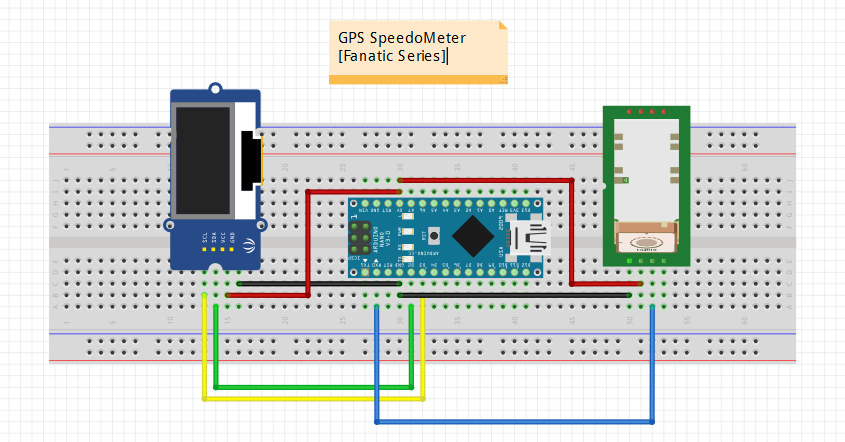#include <TinyGPS++.h>
#include <SoftwareSerial.h>
#include <SPI.h>
#include <Wire.h>
#include <Adafruit_GFX.h>
#include <Adafruit_SSD1306.h>
#define OLED_RESET 4
Adafruit_SSD1306 display(OLED_RESET);
#define NUMFLAKES 10
#define XPOS 0
#define YPOS 1
#define DELTAY 2
#define LOGO16_GLCD_HEIGHT 16
#define LOGO16_GLCD_WIDTH 16
char timeinmin[32];
String speedinkm;
int f=0;
int valid=0;
static const uint32_t GPSBaud = 9600;
TinyGPSPlus gps;
void Display_data(){
display.clearDisplay();
// text display tests
display.setTextSize(3);
display.setTextColor(WHITE);
if(f<10){display.setCursor(103,0);}
if(f>=10){if(f<100){display.setCursor(85,0);} else{display.setCursor(67,0); }}
display.println(speedinkm);
display.setTextSize(1);
display.setTextColor(WHITE);
display.setCursor(95,22);
display.println("KM/H");
display.setTextSize(2);
display.setTextColor(WHITE);
display.setCursor(0,17);
display.println(timeinmin);
display.setTextSize(1);
display.setTextColor(WHITE);
display.setCursor(0,8);
display.println("Time");
if(valid==0){
display.setTextSize(1);
display.setTextColor(WHITE);
display.setCursor(25,0);
display.println("Syncing");
}
if(valid!=0){
display.setTextSize(1);
display.setTextColor(WHITE);
display.setCursor(25,0);
display.println(" ");
}
display.display();
delay(2000);
}
void setup()
{ Serial.begin(115200);
Serial1.begin(GPSBaud);
display.begin(SSD1306_SWITCHCAPVCC, 0x3C); // initialize with the I2C addr 0x3C (for the 128x32)
}
void loop()
{
Time(gps.time);
valid=gps.location.lat();
f = round( gps.speed.kmph());
speedinkm = String(f);
Serial.print(speedinkm);
Serial.println();
smartDelay(500);
Display_data();
}
static void Time(TinyGPSTime &t)
{
sprintf(timeinmin, "%02d:%02d", t.hour(), t.minute());
// timeinmin[0]='1';
//timeinmin[1]='9';
Serial.print(timeinmin);
//Serial.print(" ");
// Serial.print(timeinmin[1]);
int temp1 = (int)timeinmin[0];
temp1=temp1-48;
temp1=temp1*10;
temp1=temp1+((int)timeinmin[1]-48);
temp1=temp1+5;
if(temp1>=24){temp1=temp1-24;}
char a[2];
itoa(temp1, a, 10);
timeinmin[0]=a[0];
timeinmin[1]=a[1];
}
static void smartDelay(unsigned long ms)
{
unsigned long start = millis();
do
{
while (Serial1.available())
gps.encode(Serial1.read());
} while (millis() - start < ms);
}
static void printFloat1(float val, bool valid, int len, int prec)
{
if (!valid)
{
while (len-- > 1)
Serial.print('*');
Serial.print(' ');
}
else
{
Serial.print(val, prec);
int vi = abs((int)val);
int flen = prec + (val < 0.0 ? 2 : 1); // . and -
flen += vi >= 1000 ? 4 : vi >= 100 ? 3 : vi >= 10 ? 2 : 1;
for (int i=flen; i<len; ++i)
Serial.print(' ');
}
smartDelay(0);
}
static void printInt(unsigned long val, bool valid, int len)
{
char sz[32] = "*****************";
if (valid)
sprintf(sz, "%ld", val);
sz[len] = 0;
for (int i=strlen(sz); i<len; ++i)
sz[i] = ' ';
if (len > 0)
sz[len-1] = ' ';
Serial.print(sz);
smartDelay(0);
}
static void printDateTime(TinyGPSDate &d, TinyGPSTime &t)
{
if (!d.isValid())
{
Serial.print(F("********** "));
}
else
{
char sz[32];
sprintf(sz, "%02d/%02d/%02d ", d.month(), d.day(), d.year());
Serial.print(sz);
}
if (!t.isValid())
{
Serial.print(F("******** "));
}
else
{
char sz[32];
sprintf(sz, "%02d:%02d:%02d ", t.hour(), t.minute(), t.second());
Serial.print(sz);
}
printInt(d.age(), d.isValid(), 5);
smartDelay(0);
}
static void printStr(const char *str, int len)
{
int slen = strlen(str);
for (int i=0; i<len; ++i)
Serial.print(i<slen ? str[i] : ' ');
smartDelay(0);
}









_3u05Tpwasz.png?auto=compress%2Cformat&w=40&h=40&fit=fillmax&bg=fff&dpr=2)
Comments
Please log in or sign up to comment.